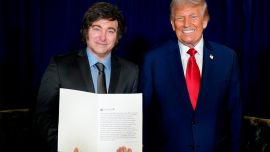Israeli Prime Minister Benjamin Netanyahu on Monday announced a pause to divisive judicial reforms moving through parliament, after months of street rallies that drew tens of thousands.
"Out of a sense of national responsibility, out of a will to prevent a rupture among our people, I have decided to pause the second and third readings of the bill," he told the nation.
Netanyahu added he would delay consideration of the bill to the next session of parliament which begins in the second half of April.
Israeli President Isaac Herzog earlier Monday had called for an immediate halt to the legislative process, a day after Netanyahu fired his defence minister Yoav Gallant for making a similar demand.
That sparked a general strike call on Monday from Israel's top trade union chief, Arnon Bar-David, but he called off the action after Netanyahu's address.
"Following the prime minister's announcement I declare the end of the strike," Bar-David, chairman of the Histadrut trade union confederation, said in a statement.
Flights were disrupted, hospitals stopped non-emergency service, and even diplomats had walked off the job on Monday.
Some 80,000 demonstrators joined the Jerusalem rally against the reform package, Israeli media estimated, while right-wing backers of the overhaul called on supporters to protest later on Monday. Demonstrators have for months decried the plans as a threat to Israel's democracy.
"I call on all protesters in Jerusalem, from the left or the right, to act in a responsible manner and not act with violence," Netanyahu tweeted earlier in the day.
The plans have sparked concern from Israel's top allies including the United States. The White House noted that US President Joe Biden had told Netanyahu that "democratic values have always been, and must remain, a hallmark of the US-Israel relationship."
Netanyahu's government, a coalition between his Likud party and extreme-right and ultra-Orthodox Jewish allies, argue the changes are needed to rebalance powers between lawmakers and the judiciary.
Gallant, the outgoing defence minister who had been a staunch ally of Netanyahu, called Saturday for a halt to the reforms, citing "a clear, immediate and tangible threat to Israel's security."
"The growing social rift has made its way into the [army] and security agencies," he said.
Moments after Netanyahu fired Gallant, demonstrators waving national flags blocked a central highway in the coastal city of Tel Aviv.
'Mad reform'
Israelis rallied outside parliament in Jerusalem on Monday, where demonstrator Keren Mimran said "everyone should strike today.|"
"We are calling on the government to stop this mad reform," the 57-year-old high-tech worker told AFP.
Despite the upheaval, Israel's national security minister called Monday on right-wing supporters to join a counter-protest in Jerusalem backing the judicial shake-up.
"Today we stop being silent. Today the right wakes up," Itamar Ben-Gvir wrote on Twitter.
Israeli media reported the extreme-right minister held talks with the premier on Monday afternoon and was threatening to quit the government if the overhaul is put on ice.
Opposition leader Yair Lapid said the government "has undergone a hostile takeover by a messianic, nationalist and anti-democratic group."
The architect of the overhaul, Justice Minister Yariv Levin, said he will "accept any decision that Prime Minister Netanyahu makes" on the legislation.
A parliamentary committee has amended the draft law to make it more acceptable to opponents, but the opposition has ruled out backing any part of the reform package until all legislative steps are halted.
Netanyahu last week vowed to "responsibly advance" the reforms and "end the rift" they have caused.
In response, Attorney General Gali Baharav-Miara on Friday accused Netanyahu of "illegal" public intervention on the process of adopting the judicial reforms, citing potential conflict of interests due to his ongoing trial.
The premier faces charges of bribery, fraud and breach of trust which he denies.
'Democracy in danger': timeline of Israel protests
Months of turmoil in Israel over controversial judicial reforms that have sparked massive anti-government protests deepened on Monday as unions declared a strike and flights were suspended.
January 4: Reforms unveiled – Israel's Justice Minister Yariv Levin unveils plans to reform the judicial system which would give politicians more power over the courts.The proposed measures include giving parliament the power to overrule some Supreme Court decisions, and the government a greater say in the appointment of judges. Levin claims the court's power to strike down legislation is a "danger" to democracy. Critics accuse Netanyahu, who is on trial on corruption charge he denies, of trying to use the reforms to quash possible judgements against him. Opposition leader Yair Lapid says the proposal "endangers the entire legal system of the State of Israel."
January 7: First mass protests – Thousands of people in Tel Aviv demonstrate against the reforms and other policies of Netanyahu's administration, one of the most right-wing governments in Israeli history. Some protesters carry placards warning: "Democracy in danger."
January 12: Top judge speaks out – Supreme Court president Esther Hayut in rare public remarks calls the reform package "an unbridled attack on the legal system, as if it were an enemy."
January 21: Demonstrations spread – By the third week of Saturday protests, the numbers of demonstrators grow to the tens of thousands and spread from Tel Aviv to other cities, including Haifa and Jerusalem.
January 24: Tech workers join in – Hundreds of Israeli high-tech workers join the protests, claiming the government's controversial plans will hurt the flourishing sector – a cornerstone of Israel's economy – by undermining the rule of law and pushing away investors.
February 12: President's appeal – President Isaac Herzog, who has a largely ceremonial role, warns Israel is "on the verge of legal and social collapse" and urges Netanyahu not to introduce the reforms.
February 21: UN urges rethink – Volker Turk, the United Nations human rights chief, urges Israel to pause the reforms, saying he is concerned that "if passed, these changes risk weakening human rights protections for all." Netanyahu denounces the appeal as an "absurdity."
March 1: Police crackdown – Police in Tel Aviv use stun grenades, water cannon and officers on horseback to disperse protesters who attempt to block roads and railways in what organisers call a "day of disruption." Netanyahu accuses the demonstrators of crossing "a red line" and says he would not "tolerate anarchy."
March 6: Fiighter pilots protest – Thirty-seven Israeli air force pilots announce boycott of military training in protest at the reforms.
March 15: German 'concern' – German Chancellor Olaf Scholz expresses "great concern" over the reforms during a visit by Netanyahu to Berlin, calling on the Israeli government to compromise.
March19: Biden call – US President Joe Biden in a call with Netanyahu also urges "compromise." He tells the Israeli leader that the judicial reforms must respect the democratic values that Biden calls a "hallmark" of the US-Israeli relationship.
March 25: Minister breaks ranks – Israel's Defence Minister Yoav Gallant breaks ranks with Netanyahu by calling to halt legislation. He cites "a clear, immediate and tangible threat to Israel's security" as the unrest spreads to security agencies. An estimated 200,000 people demonstrate in Tel Aviv.
March 26: Minister fired – Back from a visit to London, Netanyahu fires Gallant. The United States says it is "deeply concerned" about the developments in Israel.
March 27: General strike – Israel's top trade union leader Arnon Bar-David declares a general strike. President Herzog calls for the reform to be halted "immediately." Justice Minister Levin says he will "accept any decision that Prime Minister Netanyahu makes."
– TIMES/AFP


























Comments